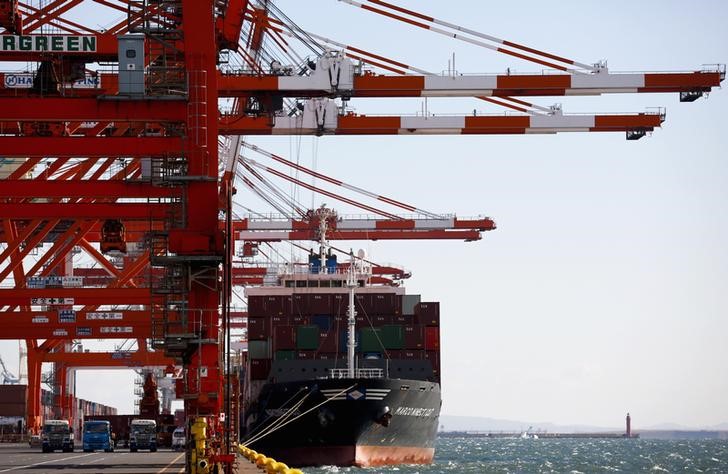By Tetsushi Kajimoto
TOKYO (Reuters) - Japan's exports grew the most in a year in December, helped by a weak yen and a pick-up in overseas demand led by the United States, an encouraging sign for the recession-hit economy even as doubts persist about the strength of global consumption.
The 12.9 percent year-on-year rise in exports marked a fourth straight month of growth, supported by shipments of cars to the United States and of electronics parts to China, data by the Ministry of Finance (MOF) showed on Monday.
A recovery in exports, which has been a soft spot in the world's third-largest economy, could be a source of comfort for Prime Minister Shinzo Abe, who is battling to re-kindle growth after an April sales tax hike drove Japan into a recession.
Still, with the exception of the United States, a largely gloomy global economic outlook has cast a cloud over external demand. The slump in oil prices to below $50 a barrel has also heightened global consumption and deflation concerns.
Imports rose less than expected, leaving Japan with a trade deficit for a record 30th month in a row.
"Exports have bottomed out but I doubt whether they will accelerate from now on due to growing uncertainty over the global economy," said Takeshi Minami, chief economist at Norinchukin Research Institute.
The MOF data showed exports to the United States rose 23.7 percent in the year to December, while those to China rose 4.3 percent.
Shipments to Asia, which account for more than half of Japanese shipments, grew 11.0 percent year-on-year in December. EU-bound exports rose 6.8 percent.
Overall imports rose 1.9 percent on the year in December versus a 2.3 percent gain expected, as sharp falls in crude oil prices cut into the value of purchases.
That helped cut the December trade nearly in half from a year ago to 660.7 billion yen (4 billion pounds).
For the full-year 2014, however, Japan's trade deficit hit a record 12.78 trillion yen, largely due to heavy imports of liquefied natural gas as utilities burned more of the fuel to compensate for the shutdown of all nuclear plants for safety checks after the Fukushima disaster of 2011.
DOUBLE-EDGED SWORD
But cheap oil also compounds the challenge for the BOJ's aim of hitting its 2 percent inflation goal around the coming fiscal year from April, which analysts see as impossible to achieve.
Indeed, on Wednesday the BOJ sharply cut its inflation forecast, and Governor Haruhiko Kuroda conceded it may take longer than expected to hit the price target.
The yen <USD/JPY> has fallen sharply against the dollar although it has pulled back from recent lows. The dollar was at around 118 yen on Monday, off a 7-year high of above 120 yen hit last month, but still about 35 percent higher since Abe took office in late 2012.
Despite the yen's depreciation under Abenomics stimulus policies, exports have been slow to pick up as Japanese firms shifted production overseas, while others have sought to boost profits by maintaining sales prices rather than cutting them to boost their export volume.
New domestic orders and new export orders both rose at a faster clip in January, a private manufacturing survey showed last week.
